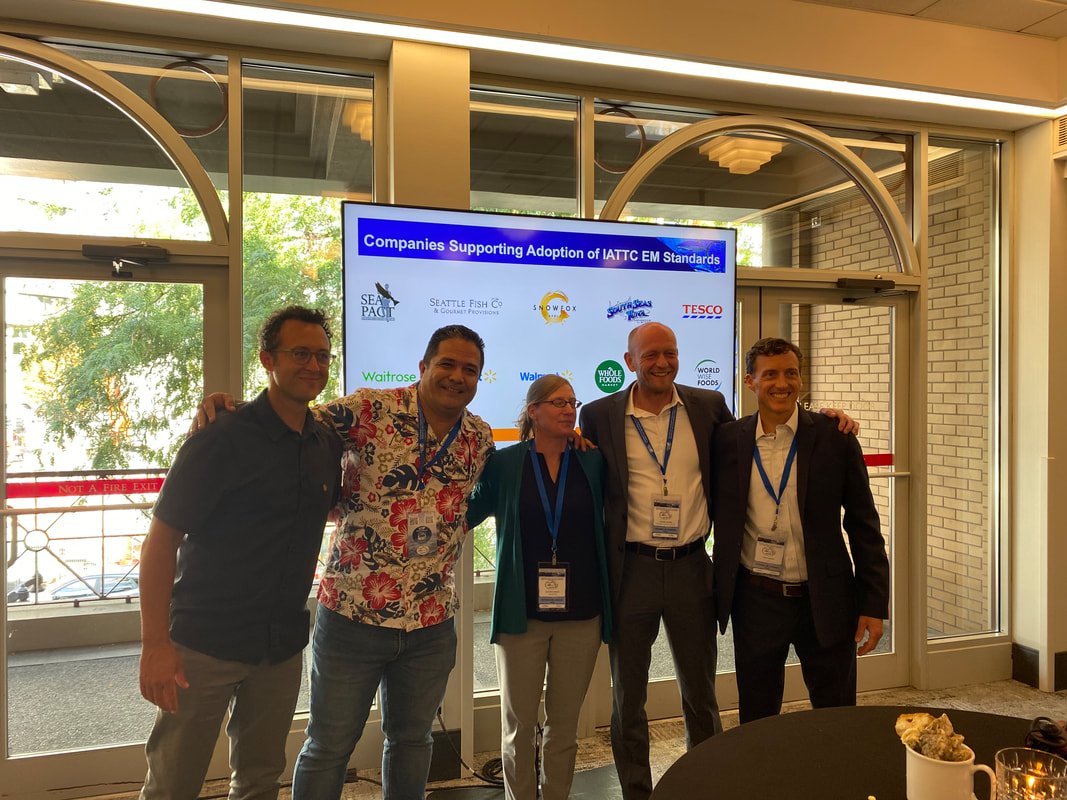PEW Charitable Trusts & Global Tuna Alliance Collaborate at IATTC Meeting
Along with fellow Sea Pact member Hamish Walker from Seattle Fish, I had the honor of attending the annual Commission meeting for the Inter-American Tropical Tuna Commission (IATTC) hosted by the Canadian government in Victoria, BC. Neither of us had attended a regional fisheries management organization (RFMO) meeting before. It was an extremely enlightening experience.
The IATTC is the RFMO responsible for the conservation and management of tuna and tuna -like species, associated species and their ecosystems, throughout the Eastern Pacific Ocean, from Canada, in the north, to Chile, in the South. Industry is always being asked to sign letters of support for proposals and management strategies prior to RFMO meetings to encourage the delegates to improve and/or progress management measures. As representatives of the sustainable seafood industry, we often wonder if we are supporting the right initiatives on behalf of our customers, suppliers, and fishing communities. In the weeks leading up to the meeting, we both did as much as we could to prepare ourselves. The GTA organized a couple virtual meetings and went over the GTA’s recommendations for the proposals to be presented at the meeting. Hamish and I also met with the Assistant Regional Administrator of the Sustainable Fisheries Division of NOAA Fisheries West Coast Region and his team that represent the US Delegation at the Commission meetings prior to attending. Even with all that preparation we were still not sure what we were in for.
At the 101st meeting of the IATTC the seating in conference room was set up in a square with the IATTC staff including the Director, Chair, and Scientific Advisory Committee at the front of the room and the other three sides lined with member countries’ delegates and the NGO community representatives lining the back row. There appeared to be no more than 3 people at most representing each country in the room and only one per NGO. I quickly became aware that each delegation has an army of staff behind the scenes supporting them. After EVERY representative on each delegation introduced themselves, there were presentations of the proposals submitted by the members, presentations from the Scientific Advisory Committee, recommendations by the Commission staff, and lots of talk of the budget. I could go into greater detail, but you would quickly become disinterested. For more captivating recaps see Senior Program Associate of International Fisheries Conservation for The Ocean Foundation, John Bohorquez’s post and the GTA’s report. I personally needed to experience an RFMO meeting to really understand the inner workings. There are a lot of behind-the-scenes discussions at breaks and editing of shared google documents to revise proposals for greater agreement. It is very impressive to see how various countries and cultures can unite to make decisions that affect so many livelihoods, and on the flip side, how countries will adamantly stand their ground and oppose proposals pushing for further revisions.
The market sector needs to get more involved, and that could mean attending meetings to get a better idea of the system. There are also opportunities to participate in intersessional meetings and for further advocacy. Hamish spoke at a reception in front of Commission members with Monterey Bay Aquarium, Costa Rica’s head of delegation, The Nature Conservancy, and the Ecology Action Center on the importance of electronic monitoring for an assured supply, and how our customers are demanding more sustainable seafood every day. He pointed out that industry is putting its money where its mouth is, including Sea Pact’s recently funded projects with Mote Marine Laboratory’s Center for Fisheries Electronic Monitoring on developing and accessing electronic monitoring technology as a tool in the Gulf of Mexico commercial reef fish fishery, as well as Seafood and Fisheries Emerging Technology’s effort to supporting the regional adoption of electronic monitoring systems through a community of practice and innovation.
Special thanks to PEW Charitable Trusts and Global Tuna Alliance for their support in making our trip and participation in the IATTC meeting possible.
Stacy Schultz is the Director of Marketing & Sustainability Coordinator for Fortune Fish and Gourmet (a founding Sea Pact member). She contributed this blog after attending her first-ever RFMO meeting along with Hamish Walker, Chief Sustainability Officer at Seattle Fish (also founding Sea Pact member).

